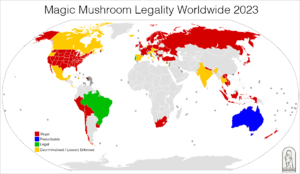Legality of Psilocybin Worldwide
Magic mushrooms, also known as psilocybin mushrooms or simply "shrooms," have been used for centuries for their hallucinogenic properties and potential therapeutic benefits. However, their legal status varies significantly across the globe. This article explores the legality of magic mushrooms worldwide, shedding light on the complex and evolving legal landscape surrounding these fungi.
North America
- United States: In the United States, the legal status of magic mushrooms is a patchwork of state-by-state regulations. Several states have decriminalized or legalized psilocybin for medical or recreational use. Notable examples include Oregon, where Measure 109 allows regulated medical use, and Colorado and California, where local jurisdictions have decriminalized the possession and use of psilocybin. However, they remain classified as Schedule I controlled substances at the federal level, making their possession, sale, or distribution illegal under federal law.
- Canada: Canada's approach to magic mushrooms has been more permissive. Psilocybin was legalized for medical use in August 2020, allowing patients with certain conditions to access it under medical supervision. Recreational use remains illegal, but the legalization of psilocybin for medical purposes suggests a more open attitude towards its potential benefits.
Europe
- Netherlands: The Netherlands is famous for its tolerant stance on recreational drug use, including magic mushrooms. While psilocybin-containing mushrooms are illegal to cultivate or sell, they are not classified as controlled substances for personal use. This unique legal status has allowed "magic truffles," a related product containing psilocybin, to be sold in smart shops.
- Portugal: Portugal decriminalized all drugs in 2001, including magic mushrooms. Possession and use of small amounts of psilocybin are considered a health issue rather than a criminal offense, and individuals found with small quantities typically face administrative fines or mandatory counseling.
- United Kingdom: In the UK, magic mushrooms are considered a Class A drug, and possession, sale, or cultivation is illegal. This strict stance reflects the British government's war on drugs policies.
Global Perspectives
- Brazil: In Brazil, magic mushrooms have a somewhat ambiguous legal status. While the cultivation and sale of psilocybin-containing mushrooms are illegal, possession for personal use is not explicitly prohibited, leading to various interpretations of the law.
- Australia: The legal status of magic mushrooms in Australia varies by state although psilocybin and MDMA are prescribable by authorised psychiatrists. In some states, such as Queensland and New South Wales, possession, sale, or use of magic mushrooms is illegal. In contrast, other states, like South Australia and the Australian Capital Territory, have decriminalized or adopted a more lenient approach to their use.
- Japan: In Japan, psilocybin-containing mushrooms are classified as illegal narcotics. Possession, sale, or use of magic mushrooms can result in severe penalties, including imprisonment.
Conclusion
The legal status of magic mushrooms worldwide remains a complex and evolving issue. While some countries and states have moved towards decriminalization or even legalization for medical or recreational purposes, others maintain strict prohibitions. The shifting landscape reflects changing attitudes and growing interest in the therapeutic potential of these fungi. It is essential for individuals to stay informed about the specific regulations in their region and be aware of the potential legal consequences of magic mushroom possession or use.
